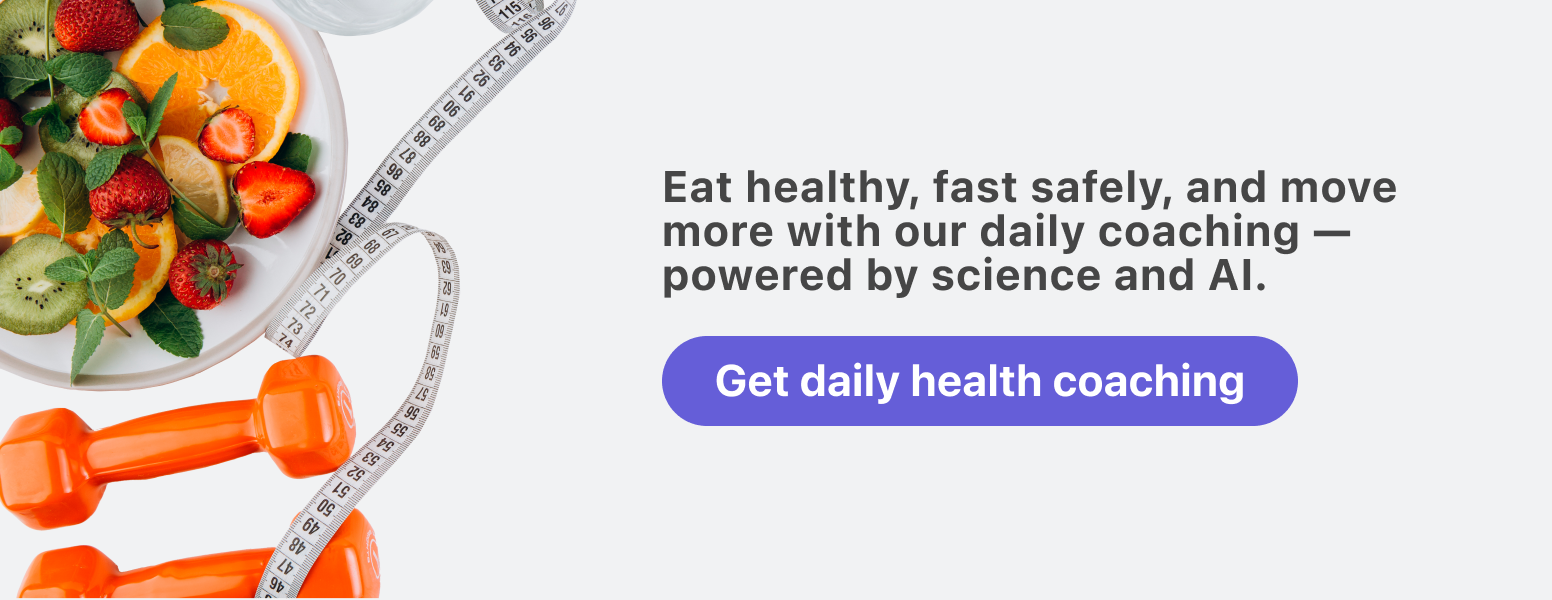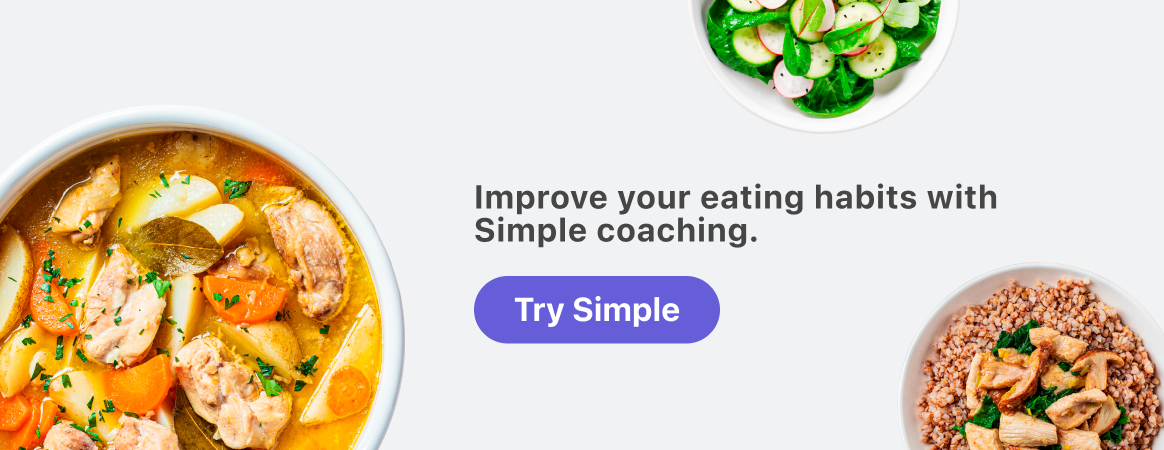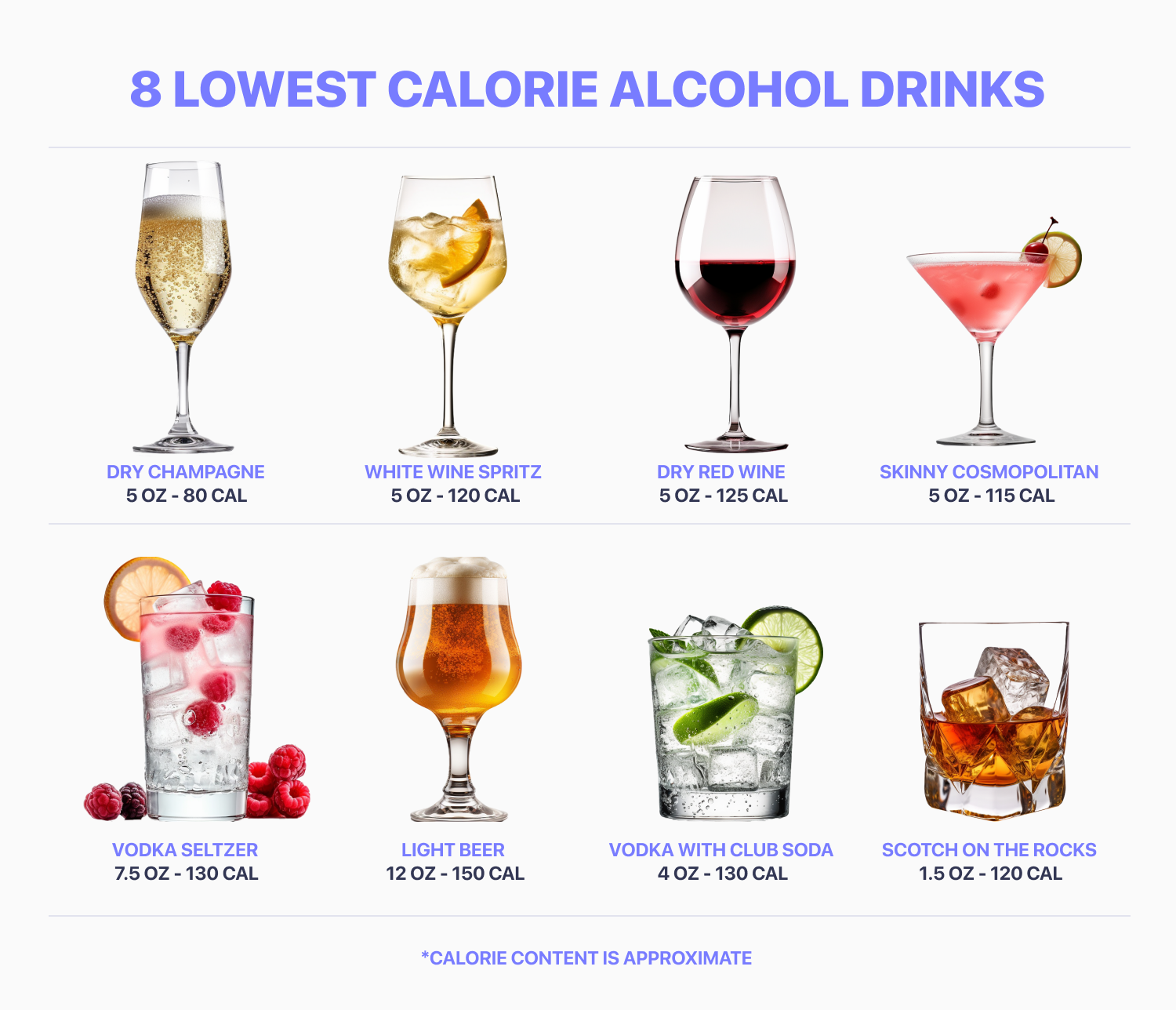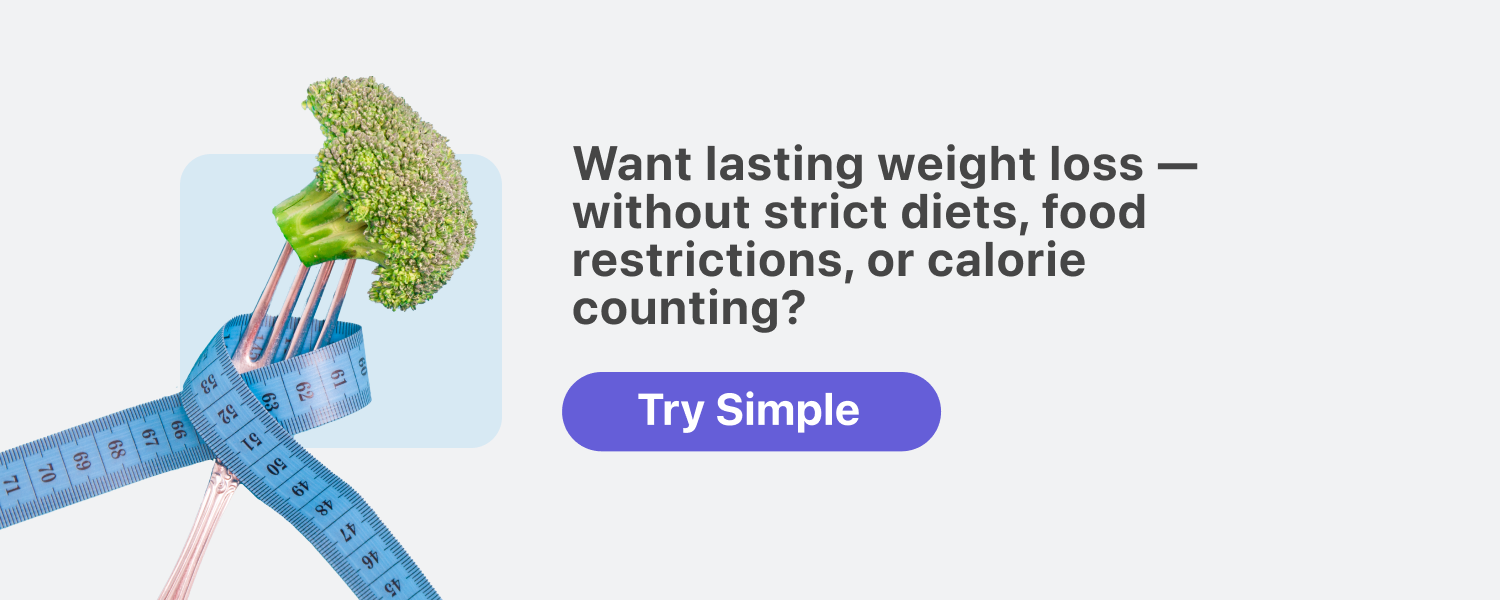Intermittent fasting and alcohol — a guide by Simple

Thanks to common marketing ploys and promotions like Margarita Monday, Boozeday Tuesday, Wine Wednesday, and Thirsty Thursday, it can feel like there’s a fun (often alliterative) reason to raise a toast daily. Not to mention those happy hour deals …

But what seems like a fun and relaxing opportunity to catch up with friends, enjoy a cozy date night out, or snag your favorite drink at a steep discount can feel like a minefield when you’re intermittent fasting. You know your eating routine shouldn’t prevent you from living life and enjoying what makes you happy, but can intermittent fasting and alcohol even mix, or is it an oil and water situation? And if you can drink alcohol during intermittent fasting, does alcohol break a fast, and will it affect potential intermittent fasting results?
Before your head starts to get as fuzzy as the last time you did tequila shots, let’s give you the low down on everything you need to know about drinking alcohol while fasting. Need a refresher on intermittent fasting in general first? Pop over to our guide on intermittent fasting for beginners.

So, can you drink alcohol while intermittent fasting?
If the thought of sacrificing those beers during tailgating or wine and whine sessions with your besties fills you with dread, we’ve got good news for you: alcohol and fasting can go together.
Like any well-crafted cocktail, it’s all about the ingredients, the amounts, and the timing. Imagine if you were handed a White Russian — heavy on both the milk and some bottom-shelf vodka — during a summer wedding. And you were about to play a game of limbo.
Not an ideal combo, right?
While you can, in theory, combine alcohol with fasting, making sure it’s a mixology success involves considering a few things:
- Alcohol is a calorie-dense drink. That means it won’t mesh with your fasting window and can massively add to the total calories consumed during your eating window. It can also stimulate appetite and lead to overeating.[1]
- While moderate alcohol intake may not impact the benefits of intermittent fasting (and has been associated with a reduced risk of heart disease or type 2 diabetes in men,[2,3]) heavy alcohol consumption could.[4] For instance, it could lead to weight gain or a higher risk of negative health outcomes.[4,5]
- Not all alcohol is created equal — certain drinks and spirits may contain some nutritional benefits and are less caloric than others.
We’ll dig into each of these concepts in more detail throughout the rest of this article, but the bottom line is that alcohol and intermittent fasting can pair well together under certain circumstances.
To learn more about those circumstances and figure out what an ideal fasting schedule might look like for you (with or without alcohol!), you can take our Simple quiz.
Does alcohol break a fast?

A fast is broken by consuming calories. Alcohol contains calories.
Unfortunately, no matter how much you toy with the calculator and try to find a loophole, there’s no other way to make this equation work: alcohol breaks a fast.
That doesn’t mean it breaks the effects of a fast, though, as long as you consume it in moderation during your eating window. Though for the best results, we don’t recommend drinking consistently during a fasting-based food routine, even if it is in moderation!
Even though one of the best bits of an intermittent fasting schedule is that you’re focusing on when you eat and drink rather than what you eat and drink, we know it’s tricky trying to figure out exactly when and exactly what to eat and drink. That’s why we’ve put together guides on what to eat during intermittent fasting, what you can drink while fasting, and what breaks a fast so you never have to have one of those “wait, is this okay?” moments again.
The effects of excessive alcohol drinking while intermittent fasting
When you’re intermittent fasting, alcohol in moderation may not pose a threat to the process, but what happens if you drink excessively?
First up, let’s clarify something: “excessive” can be a relative term. Sure, if you’re mixing the two, you probably want to aim for an experience that’s more spinning on the dance floor than having the spins. But what’s considered “excessive” can vary from person to person, depending on your unique circumstances and the goals you have for intermittent fasting in the first place.
So, for the sake of having a general (if not super inclusive) figure in mind, let’s use the CDC’s definition:[6] moderate drinking is up to two drinks a day for men and one for women, and excessive drinking is anything beyond that.
And no, sadly, those glasses that can hold a bottle of wine don’t count as “one drink.”
In excess, alcohol can undermine the success of intermittent fasting by counteracting potential intermittent fasting benefits. For example, excessive alcohol consumption can:
- trigger inflammation throughout your system;[7]
- prevent fat oxidization;[8]
- impede liver function;[9]
- prevent cell repair and increase neural damage;[10,11] and
- interfere with glucose metabolism,[12] which can increase the risk of developing type 2 diabetes.
It can also exacerbate intermittent fasting side effects (like poor sleep, headaches, and increased appetite) or lead to intermittent fasting mistakes (like dehydration or overeating).
Of course, some occasional overindulgence won’t create lasting damage, and we’re not here to judge if that sweet serenade of the wedding’s open bar is a siren call you can’t resist. Just keep in mind that alcohol in excess can be like the little devil on your shoulder who doesn’t always have your best interests at heart — and may be actively working against the goals you’ve set for yourself.

How does drinking alcohol impact weight loss?
While we think of intermittent fasting as a lifestyle rather than a “diet,” one of the most common reasons people choose to adopt a fasting-based food routine is to support weight loss.
If you’re fasting for this reason, alcohol is like the demotivational inner saboteur you didn’t know you had.
Alcohol — especially in excessive amounts — may not only decrease the long-term success of your weight loss journey but also stimulate overeating,[1,13] particularly once you’ve taken your first bite,[14] and may increase levels of the hormone that makes you feel hungry.[15]
It may also lead to having more cravings and making less health-promoting food choices during your eating windows.[16,17] (Here’s looking at you, extra salty chips and hungover carb binges.)
Since a large amount of alcohol can stress your stomach and make your liver work extra hard in processing all that extra sugar,[18] some studies also suggest it can slow your metabolism by getting in the way of nutrient uptake and contributing to metabolic dysfunction.[19,20]
Bottom line: alcohol and weight loss go together like you and beer pong — there’s a time and a place, and there’s always room for the occasional spontaneous indulgence, but it’s probably not a great weekly choice.
If you’re considering drinking alcohol while intermittent fasting for weight loss, we can help you find a schedule that works for you, keep you on track with your goals, and answer any specific questions you have about things like “Can I drink alcohol while fasting?” and “Does intermittent fasting slow metabolism?” Just head over to our Simple quiz to get started!
So, do I have to give up alcohol completely while intermittent fasting?
As long as you avoid excessive amounts of alcohol, intermittent fasting doesn’t need to translate into a teetotal transformation.
And before you raise a glass to that, here’s some extra good news: there are a few things you can do to make sure that “bottoms up” moment doesn’t turn into upending your whole fasting schedule.
- Eating before drinking: While there isn’t actually a ton of research to support that drinking on a full stomach is actually better for your health or safety,[21] eating before you start drinking may not only help you feel less drunk but also ensure you’re at least getting some of the nutrients you need for the day in case your body starts craving less nutrient-dense foods when it starts to digest the alcohol.
- Pre-stocking your fridge: If a night out is in the cards, stock the house with calorie-free drinks and health-promoting foods you enjoy so you’re less tempted to stumble home and fall directly into the comforting embrace of calorie-dense and nutrient-poor foods. There’s absolutely nothing wrong with that greasy takeout or eating shredded cheese straight from the bag once in a while if it’s something you enjoy, but that enjoyment is crucial — you want your choices to be guided by what actually tastes good and not whatever drunchies are within reach of your hunger hulk.
- Set up strategies to help reduce alcohol-related calories: Getting ready for a long night of dancing or an all-day summer barbecue? Try alternating alcoholic drinks with calorie-free soft drinks to boost hydration while lowering that total calorie count. You can also shoot for single-spirit drinks and low-to-no calorie mixers, like diet sodas, no-sugar-added juices, or flavored sparkling waters. Particularly if you’re aiming for weight loss, consuming too many calories during your eating window is one of the most common ways you end up in the “intermittent fasting not working” dilemma, and alcohol can definitely pack a sneaky caloric punch if you’re not careful.
Are some types of alcohol better than others for intermittent fasting?

Remember when we mentioned not all alcohol is created equal? If you’re looking to combine alcohol with intermittent fasting, there are two factors to keep in mind for creating a blend that doesn’t separate your tastebuds from your fasting goals: calorie content and polyphenol content.
Calorie content is pretty self-explanatory (just like golf, the lower the number, the better), and polyphenols are a type of plant-based compound naturally found in some foods and drinks that have antioxidant, health-benefiting properties.[22]
(Psst! Wine lovers, rejoice: grapes are one of the most concentrated sources of polyphenols out there!)
So, next time you’re browsing a drinks menu or debating what bottle to add to your shopping cart, consider your choices through the “low-calorie, high-polyphenol” lens. Skip things high in calories and carbohydrates like regular beer, sweet wine, sugar-heavy spirits (like whiskey / rum), and cocktails loaded with mixers and syrups. Instead, prioritize red and white wine, champagne, light beer, and single, clear spirits that pair well with light mixers (like vodka and gin).

- Kwok A, Dordevic AL, Paton G, Page MJ, Truby H. Effect of alcohol consumption on food energy intake: a systematic review and meta-analysis. Br J Nutr. 2019 Mar;121(5):481–95.
- Mathews MJ, Liebenberg L, Mathews EH. The mechanism by which moderate alcohol consumption influences coronary heart disease. Nutr J. 2015 Apr 2;14:33.
- Wu X, Liu X, Liao W, Kang N, Dong X, Abdulai T, et al. Prevalence and characteristics of alcohol consumption and risk of type 2 diabetes mellitus in rural China. BMC Public Health. 2021 Sep 9;21(1):1644.
- Zhao J, Stockwell T, Naimi T, Churchill S, Clay J, Sherk A. Association Between Daily Alcohol Intake and Risk of All-Cause Mortality: A Systematic Review and Meta-analyses. JAMA Netw Open. 2023 Mar 1;6(3):e236185.
- Wannamethee SG, Shaper AG. Alcohol, body weight, and weight gain in middle-aged men. Am J Clin Nutr. 2003 May;77(5):1312–7.
- Centers for Disease Control and Prevention. Alcohol and Publish Health. Facts about moderate drinking [Internet]. 2022.
- Adams C, Conigrave JH, Lewohl J, Haber P, Morley KC. Alcohol use disorder and circulating cytokines: A systematic review and meta-analysis. Brain Behav Immun. 2020 Oct;89:501–12.
- Jeon S, Carr R. Alcohol effects on hepatic lipid metabolism. J Lipid Res. 2020 Apr;61(4):470–9.
- Roerecke M, Vafaei A, Hasan OSM, Chrystoja BR, Cruz M, Lee R, et al. Alcohol Consumption and Risk of Liver Cirrhosis: A Systematic Review and Meta-Analysis. Am J Gastroenterol. 2019 Oct;114(10):1574–86.
- Varghese J, Dakhode S. Effects of Alcohol Consumption on Various Systems of the Human Body: A Systematic Review. Cureus. 2022 Oct;14(10):e30057.
- Pervin Z, Stephen JM. Effect of alcohol on the central nervous system to develop neurological disorder: pathophysiological and lifestyle modulation can be potential therapeutic options for alcohol-induced neurotoxication. AIMS Neurosci. 2021 Apr 9;8(3):390–413.
- Yu H, Wang T, Zhang R, Yan J, Jiang F, Li S, et al. Alcohol consumption and its interaction with genetic variants are strongly associated with the risk of type 2 diabetes: a prospective cohort study. Nutr Metab . 2019 Sep 13;16:64.
- Chao AM, Wadden TA, Tronieri JS, Berkowitz RI. Alcohol Intake and Weight Loss During Intensive Lifestyle Intervention for Adults with Overweight or Obesity and Diabetes. Obesity . 2019 Jan;27(1):30–40.
- Yeomans MR. Alcohol, appetite and energy balance: is alcohol intake a risk factor for obesity? Physiol Behav. 2010 Apr 26;100(1):82–9.
- Rasineni K, Thomes PG, Kubik JL, Harris EN, Kharbanda KK, Casey CA. Chronic alcohol exposure alters circulating insulin and ghrelin levels: role of ghrelin in hepatic steatosis. Am J Physiol Gastrointest Liver Physiol. 2019 Apr 1;316(4):G453–61.
- Karyadi KA, Cyders MA. Preliminary support for the role of alcohol cues in food cravings and attentional biases. J Health Psychol. 2019 May;24(6):812–22.
- Crovetto M, Valladares M, Oñate G, Fernández M, Mena F, Durán Agüero S, et al. Association of weekend alcohol consumption with diet variables, body mass index, cardiovascular risk and sleep. Human Nutrition & Metabolism. 2022 Mar 1;27:200140.
- Bishehsari F, Magno E, Swanson G, Desai V, Voigt RM, Forsyth CB, et al. Alcohol and Gut-Derived Inflammation. Alcohol Res. 2017;38(2):163–71.
- Butts M, Sundaram VL, Murughiyan U, Borthakur A, Singh S. The Influence of Alcohol Consumption on Intestinal Nutrient Absorption: A Comprehensive Review. Nutrients [Internet]. 2023 Mar 24;15(7).
- Lee K. Gender-specific relationships between alcohol drinking patterns and metabolic syndrome: the Korea National Health and Nutrition Examination Survey 2008. Public Health Nutr. 2012 Oct;15(10):1917–24.
- Ramsbottom A, Petticrew M, Huber A, van Schalkwyk MCI. Drinking on an empty stomach: a scoping review of the evidence on how consuming food with alcohol affects short-term outcomes. J Public Health [Internet]. 2022 Oct 24;
- Del Bo’ C, Bernardi S, Marino M, Porrini M, Tucci M, Guglielmetti S, et al. Systematic Review on Polyphenol Intake and Health Outcomes: Is there Sufficient Evidence to Define a Health-Promoting Polyphenol-Rich Dietary Pattern? Nutrients [Internet]. 2019 Jun 16;11(6).
